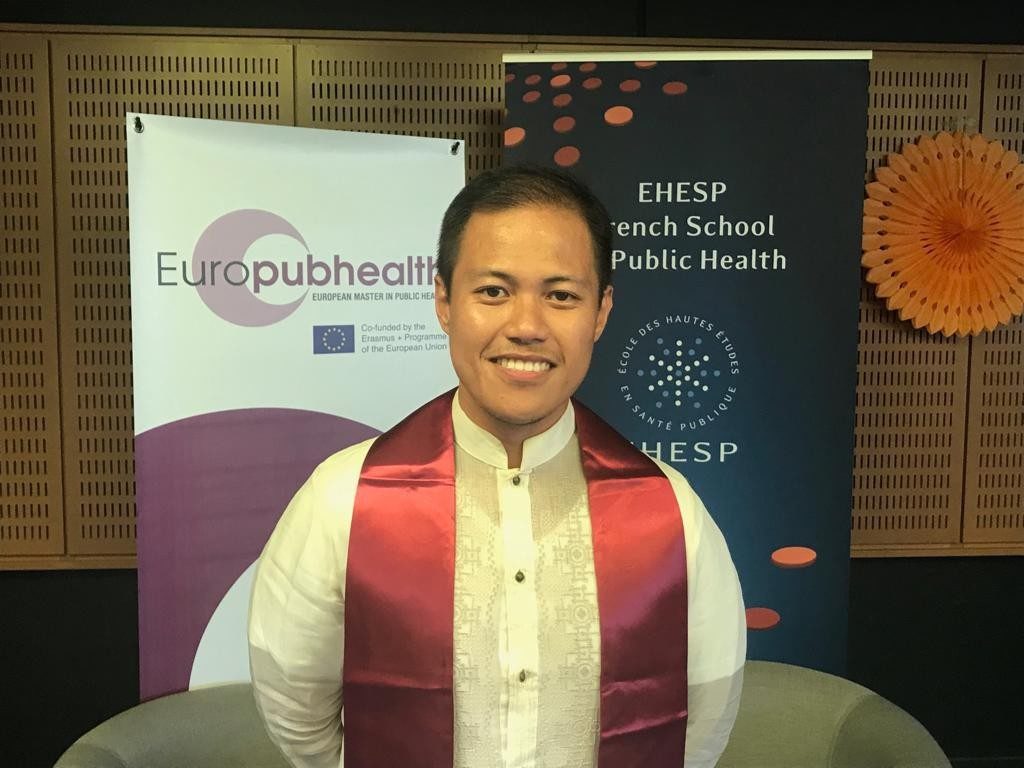october 14, 2019
Gaining New Ideas for a Public Health Future
AIHO Partner, Consultant on Health Governance, and former President
By Dr. Michael Caampued

This article was included in the inaugural (September 2019) issue of “Cultivare,” the official public health magazine of the Philippine Society of Public Health Physicians, Inc. (PSPHP).
As I was leaving, heaving from carrying two heavy bags down four flights of stairs, I reminisced with a dreary heart the moments I have spent with my beloved housemates in Krakow. I did not disturb my sleeping German roommate, who ironically promised to wake me up to say goodbye. I lived within Kazimierz since end of September 2018, which was the old Jewish district where Spielberg’s famed “Schindler’s List” was filmed. Man, Poland was beautiful and I can’t believe I’m leaving…”.
I never would have predicted that I would find myself at the end of a two-year Erasmus + (Europubhealth) scholarship obtaining a double Masters’ in Public Health from three countries in Europe. I look back though and it was not really the degree that elated me most but the whole international immersion which has essentially nullified any growing misanthropy I may have had experiencing the challenges of knee-deep, community health work in the Philippines. I got what I sought for– it liberated my mind and further affirmed my purpose.
The Erasmus + is a programme of the European Union meant to further internationalization and competitiveness of European higher education institutions. A sending partner country like the Philippines may gain from facilitated exchange of ideas, career development, and ideally, the reintegration of participating Filipinos. To me, these were understood when I entered the program. I found though that these very formal objectives seem to have been more organically-embedded throughout the whole experience.
I gained friends and chosen families that linked me to the world through more meaningful relations. I now see Nepal through the lens of a friend who have worked hard to improve their child nutrition. I worry more for the demonstrators in Hong Kong because my dear classmate grieves severely against China’s abuses. My experience has also allowed me to ossify certain realizations. That the struggle for better health is unique in as much as it is similar everywhere else. And what we know as fact becomes relative in a world of other facts. I saw how science effectively brings us a level of comfort over uncertainties. At some point, however, decisions are still largely made based on principles, values, and culture. Those with broader exposures are then more likely to take more well-rounded decisions. Internationalization and effective education, in this case, were realized through shared perspectives of struggles and aspirations.
I noted that while education in the Philippines was largely domiciled, home-grown intelligence is still astoundingly internationally at par. However, sciences like public health which take on planetary dimensions compel us to participate in a ‘global marketplace of ideas.’ Appropriate exchanges require behavioral skills that are more ethno-relativistic; or what Bennett’s model would refer to as accepting and adapting. Sadly, Filipinos still suffer dissonant realizations about who we are. Filipino pride, at times, traverses a thin-line between triumphant exclamations versus inferiority complex (as evidenced by Filipino netizen mobbing). I began to be more aware of my own unique behaviors amid a highly diverse group of people. I did regular self-checks when I engage classmates and friends. It afforded me a more honest examination of my identity. This was important, especially for us advocates who seek to map both unique and shared Filipino aspirations within the global goals for public health.
Viewing Philippines from a distance allowed a level of introspection that tamed my misanthropy. Heavy traffic became an observable experience and not an exactment for Filipino disconsolation. Politics became more so, a potent platform to negotiate people’s interests and not a game for corrupt minds. Diplomacy was further nuanced by deeper understanding and sincere intentions for collaboration; and not a skill of malicious mindplay and language manipulation. Reintegration felt more viable because my experience sensitized me to possibilities and broadened the arena for participating in solutions and actions [ though other people may have different feelings]. All in all, I had two liberating realizations: (1) that we are positively evolving our health system along a trajectory that is remarkably similar to other countries with improving health outcomes; and that (2) this experience highlighted some fundamentally precious ideals: unity in diversity, sincere collaboration, upright moral principles, and hope. What I liked most was that these will now be remembered through the faces of very dear friends whose aspirations I now also hope to protect.
Views and opinions expressed in AIHO Blog does not reflect the views and opinions of the organization.